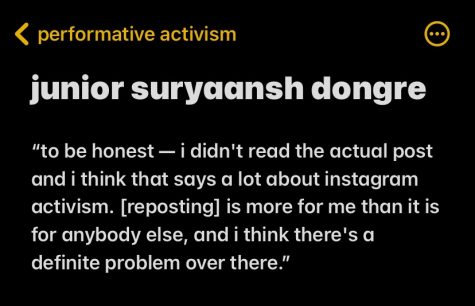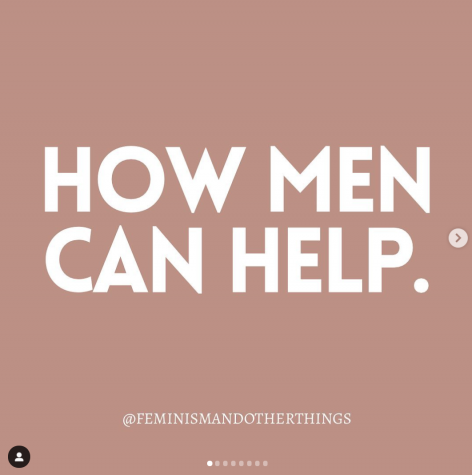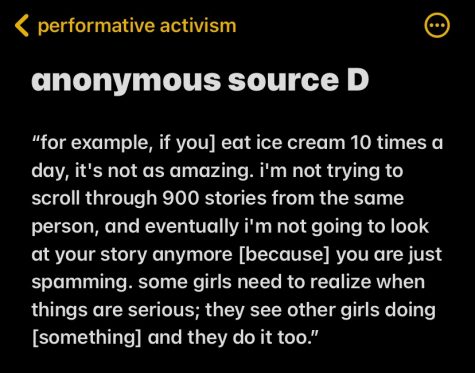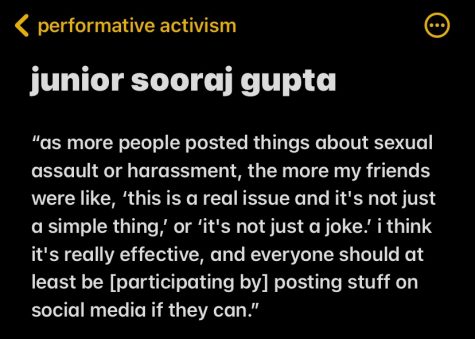“I didn’t read the actual post”
Reposting and performative activism
March 22, 2021

The influx of posts on Instagram was quickly followed by a flood of Instagram stories sharing those posts as well as infographics and accounts that pointed out how to stop perpetuating victim-blaming and rape culture.
After the tidal wave of positive responses she received, Xu published a second post on her account titled “What can I do to help?” that covered various changes that individuals can make in their language and behavior. Xu encouraged her followers to share her post in the caption, but she did, however, acknowledge how quickly sharing information on social media can become performative.
Junior Suryaansh Dongre, for example, decided to take to his Instagram story to amplify the voices of his peers. But upon further reflection, Dongre echoed Xu’s sentiment that, for many people who share posts blindly, their motivation for clicking “repost” may have less to do with highlighting others’ experiences and more with a sense of obligation.

“This is probably very shallow, but the only reason I chose this post was because a lot of people had already reposted it,” Dongre said. To be honest — I didn’t read the actual post and I think that says a lot about Instagram activism. I doubt many people have read the actual [message I wrote] and an even smaller percentage will take [the information] and do something with it. As a man who conforms to the standards of masculinity, I would like to make a change through these posts but, the reality is, I’m probably not doing anything. [Reposting] is more for me than it is for anybody else, and I think there’s a definite problem over there.”
The trend of engaging in performative activism, specifically of blindly reposting tips on how men should change their behavior, is not reserved to people who are simply afraid to be called out. One source — a cisgender, heterosexual male who chose to remain anonymous after seeing a peer who expressed similar views encounter death threats online and feared the same retribution and who we will refer to as D — explains that both his male and female peers will often saturate their accounts with performative content before getting educated, which can have adverse consequences.

“I [have] talked to certain girls about [sexual harassment], and they have no idea what they’re actually talking about,” D said. “They just seem to blab gibberish [and] I also see 900 new posts every day of [them] spamming their main story [which loses] its purpose. It’s taking away from its value when you repost a bunch of random stuff without knowing what you’re actually reposting. [For example, if you] eat ice cream 10 times a day, it’s not as amazing. I’m not trying to scroll through 900 stories from the same person, and eventually I’m not going to look at your story anymore [because] you are just spamming. Some girls need to realize when things are serious; they see other girls doing [something] and they do it too. It’s not just a girl thing, for example, if it’s a guy’s topic [such as football], and a bunch of guys are reposting it, half the people that repost don’t even watch football.”
Mahajan, in contrast to D’s point, says that individuals who appear to be overwhelming their stories with posts are often simply trying to provide resources to individuals looking to change their behavior. She explains that the best way to avoid performative activism is to put effort into getting educated about the issue at hand.
“If you are reposting stories and then not doing anything in your own life to change [your actions], then it’s not effective at all,” Mahajan said. “Social media activism is the first step to gaining awareness for these things. But after that, it’s up to people, individual people to research, ask questions [and] be generally aware of what they’re saying and what they’re doing and how their actions hurt other people.”

Social media does, in many cases, create a platform where engaging in performative activism is easy, according to Dongre. Yet, Mahajan also asserts that social media is one of the most effective tools activists in her generation can employ to spread awareness and possible call to actions, as well as speak up about issues they’ve faced. Gupta echoes this belief, stating how his peers’ posts were crucial to expanding his understanding of the challenges they’d faced.
“[Social media] is really effective because a lot of my friends — guy friends — didn’t really support it or they kept making jokes about it,” Gupta said. “As more people posted things about sexual assault or harassment, the more my friends were like, ‘This is a real issue and it’s not just a simple thing,’ or ‘It’s not just a joke.’ I think it’s really effective, and everyone should at least be [participating by] posting stuff on social media if they can.”
Along with spreading awareness, Xu explains that social media, at its core, remains a platform to connect individuals. From the people who reached out to her personally to thank her for articulating their experiences in her post to those who have shared their stories in tandem with hers, Xu believes that social media plays a crucial role in bringing issues that affect a community to the forefront of their attention.
“I think for this [topic] specifically, I’ve had people reach out to me and say things like ‘I think this is very helpful because it allows people to realize that these aren’t selective cases, these are things that happen to everyone,’” Xu said. “By seeing these things from people in your own community, I think it’s a wake up call to see that these things are very real.
